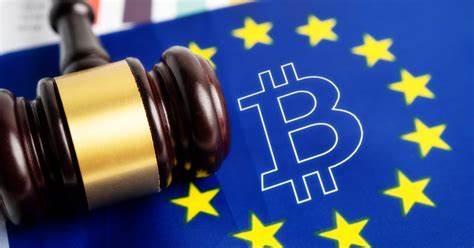Join Our Telegram channel to stay up to date on breaking news coverage
The European Parliament has passed the first-ever European Union (EU) legislation to monitor cryptocurrency asset transfers. The move is intended to discourage money laundering and, in the process, “establish standard supervision and consumer protection guidelines.”
Following the approval, cryptocurrency transfers will henceforth be subject to the “travel rule” that already applies to traditional finance. The travel rule demands that transaction data be specified, documented, and stored on both ends of the transaction. Notably, this data includes the source of the funds and the recipient.
Based on a recent press release from the European Parliament, the legislation will also affect transactions exceeding €1000 where self-hosted wallets are involved. This applies when interacting with hosted wallets controlled by cryptocurrency-asset service providers. However, transfers between individuals (where service providers or involved) or among providers themselves, as they act independently, will be exempted from the new legislation.
EU Approves Common Legislation Captured In The MiCA Framework
Additionally, the European Parliament has approved common legislation about crypto asset supervision, consumer protection, and environmental safeguards. This rule includes cryptocurrencies under the statutes defined in the MiCA framework.
Certain provisions exist in the MiCA regulations, which the Council consented to in June 2022, preventing market manipulation and financial crime. Accordingly, MiCA covers crypto assets presently unregulated by existing financial services laws. Among the main provisions targeted in the legislation include transparency, disclosure, authorization, and supervision of transactions for crypto asset issuers and traders.
The provisions are intended to improve consumers’ awareness of potential risks, costs, and charges relating to their transactions. The new legal structure is also designed to enhance market integrity and financial stability by regulating public offers of cryptocurrency assets.
EU Partners With ESMA In The Fight Against Money Laundering
The legislation features specific interventions geared towards fighting money laundering, among other illegal or criminal activities. To this end, the European Securities and Markets Authority (ESMA) has received a new mandate. Based on the report, ESMA will be expected to create a public register of non-compliant crypto asset service providers that operate within the EU illegally. This sends a warning to crypto asset providers lacking proper authorization.
Moreover, the major service providers are expected to disclose their energy consumption. This will help address the “high carbon footprint” due to crypto.
Commenting on the matter, lead MEP for the MiCA regulation, Stefan Berger, said that the legislation positions the EU at the frontline of the token economy. In his opinion, this provides regulatory clarity for the European cryptocurrency asset industry.
Ernest Urtasun and Assita Kanko have underscored Berger’s position. The two co-rapporteurs spoke about the relevance of this legislation in addressing loopholes within the European Union’s Anti Money Laundering (AML) framework. They also addressed the unification of the fragmented European market.
At this point, the new legislation will now head to the Council for its official endorsement. Afterward, it will be published in the EU Official Journal and implemented approximately three weeks later.
Binance CEO Addresses European Parliament’s Vote For MiCA Regulations Implementation
The new legislation has captured the interest of Binance CEO Changpeng Zhao (CZ). In a Twitter post on April 20, he said that the move signals the introduction of customized regulations for the crypto sector within one of the world’s largest markets.
The European Parliament voted for MiCA to be implemented.
This means one of the world’s largest markets is introducing tailored regulations for crypto to protect users and support innovation.
The fine details will matter, but overall we think this is a pragmatic solution to…
— CZ 🔶 BNB (@cz_binance) April 20, 2023
According to CZ, this will prove value-adding in protecting users and promoting innovation. The Binance executive also acknowledged that while the fine details of these regulations remain critical, it is indeed a practical solution to the challenges facing the industry.
Now that there are clear rules in place for crypto firms operating or based in the European Union, Binance could adjust its business operations over the next 12 to 18 months to achieve full compliance.
Read More:
- How European cryptocurrency companies are preparing for broad legislation with MiCA at the Door
- ECB’s Elizabeth McCaul Not Satisfied with the Current MiCA Iteration – Excerpts
- Russia Prepares Draft Legislation to Permit the Use of Crypto in Global Trade Settlements
- SEC Boss Gensler’s Days Over? Rep Davidson to Introduce Legislation
- US. Congress to Address SEC Oversight and Legislation Regarding Stablecoins
Join Our Telegram channel to stay up to date on breaking news coverage


